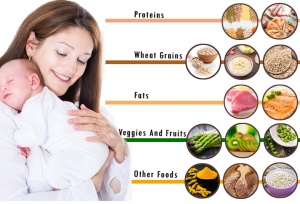Everything you need to know about Post Natal Depression
Postnatal depression is a kind of depression that affects some women after they deliver their baby. It is quite a common problem that affects 1 out of 10 women.
 The duration of a postpartum depression can begin after first six weeks of delivery and last up to six months after the baby’s birth. Teenage mothers have the highest risk of this depression but it can affect women from all ethnic groups. Many times, women are unaware of this facet of delivery and it can go unnoticed. Some of the major symptoms of postpartum depression include trouble sleeping, low moods and feeling unable to cope with the changes.
The duration of a postpartum depression can begin after first six weeks of delivery and last up to six months after the baby’s birth. Teenage mothers have the highest risk of this depression but it can affect women from all ethnic groups. Many times, women are unaware of this facet of delivery and it can go unnoticed. Some of the major symptoms of postpartum depression include trouble sleeping, low moods and feeling unable to cope with the changes.
Signs and symptoms
Constant mood changes, irritability in behaviour and tearfulness are some of the most common signs of depression in women after giving birth. These are known as baby blues and they usually disappear within a few weeks. If the symptoms continue for a longer time, it can be diagnosed as a post natal depression. Women must remember that having this illness does not make them a bad mother. They should get proper treatment for the same in order to feel good and healthy again.
 Postnatal depression screening
Postnatal depression screening
In order to confirm postpartum depression, you must visit your GP. He will ask you a few questions to get an idea about the scenario. The questions include:
- In the last month, have you been feeling low, depressed or hopeless?
- In the last month, have you taken no pleasure or happiness in the things that normally make you happy?
If your answer is yes to both these questions, there is a high chance that you are suffering from a depression and you must get the right treatment to feel yourself again.
Treating postnatal depression
This illness can be quite frightening and lonely but you must remember that it is treatable and once diagnosed, you can recover soon. It is important to discuss these problems with your partner and choose the right treatment at the right time. The different options include:
- Self-help recommendations
- Taking therapy treatments like Cognitive Behavioural Therapy (CBT)
- Using anti-depressants and other medications
Why do I have postnatal depression?
Women who have recently delivered will often feel that why they are the ones suffering from this depression while others enjoy the joys of new motherhood. There is no definite singular cause for this illness. It could be a result of various factors like:
- The stress of looking after the baby and lack of sleep
- Hormonal changes that occur during pregnancy
- Social circumstances like shortage of money or family problems
 Preventing postnatal depression
Preventing postnatal depression
If you have suffered from postpartum depression in the past, you must tell your GP during your pregnancy. This can prevent the delay in diagnosis and can be cured at an early stage. Use the following tips to prevent this depression from affecting the joys of motherhood:
- Get ample of rest and relaxation
- Exercise gently and regularly
- Eat food at regular intervals and don’t skip meals as low sugar levels can make you feel depressed
- Stay away from alcohol
- Eat a healthy and balanced diet

Above everything else, remember to stay happy and try to bond with your new born baby to avoid this depression. If you do feel depressed, get help immediately to resolve the issue and enjoy special moments with your new born.







 The duration of a postpartum depression can begin after first six weeks of delivery and last up to six months after the baby’s birth. Teenage mothers have the highest risk of this depression but it can affect women from all ethnic groups. Many times, women are unaware of this facet of delivery and it can go unnoticed. Some of the major symptoms of postpartum depression include trouble sleeping, low moods and feeling unable to cope with the changes.
The duration of a postpartum depression can begin after first six weeks of delivery and last up to six months after the baby’s birth. Teenage mothers have the highest risk of this depression but it can affect women from all ethnic groups. Many times, women are unaware of this facet of delivery and it can go unnoticed. Some of the major symptoms of postpartum depression include trouble sleeping, low moods and feeling unable to cope with the changes.



























